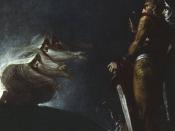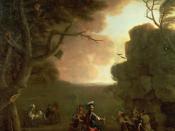The nature of humanity always forces individuals to choose between right and wrong. Sometimes, there is conflict between personal desires and moral decisions. In the play Macbeth, William Shakespeare illustrates humankind as dark and immoral. He displays the negative side of human nature through three of the main characters. First of all, Banquo who appears to be noble but succumbs to his desires. Secondly, Lady Macbeth reveals ambition that leads her to destruction. Lastly, Macbeth becomes engulfed in greed that leads to horrible deeds. Thus, Shakespeare emphasizes that greed overrules human kindness in human nature.
Banquo reveals avariciousness in pursuit of his desires. He reveals his first cupidity when he hears MacbethÃÂs prophecies by the weird sisters. Banquo states (AS BANQUO SAYS TO ÃÂ ..): ÃÂMy noble partner/You greet with present grace and great prediction/Of noble having and of royal hope,/That he seems rapt withalÃÂ speak then to me, who neither beg nor fear/Your favours nor your hate.ÃÂ
(I,iii,55-62). Banquo, who appears to be a noble man, also displays his greed by wanting to receive a great prediction just like Macbeth. Banquo also reveals his overriding by committing the sin of omission. After the assassination of Duncan, Banquo talks to himself: ÃÂAs the weird women promised:ÃÂ If there come truth from them/As upon thee, Macbeth, their speeches shine/Why, by the verties on thee made good,/May they be my oracles as well/And set me up in hope?ÃÂ (III,i,2-10). Banquo does not reveal the secret of the prophecies and his suspicion about Macbeth because Banquo believes that his prophecy will not come true if he exposes this secret information. Banquo did not act upon his greed, but his greediness of keeping secrets of the prophecies leads him to his death. Moreover, a promise between Macbeth and Banquo, stops Banquo from exposing their secrets. After hearing the news about their future, Macbeth says to ( ): ÃÂIf you shall cleave to my consent, when ÃÂtis/It shall make honour for youÃÂ (II,i,30-31). Since Macbeth promises to honor him, it makes it harder for Banquo to reveal the secret. There are some good qualities but also bad qualities in human nature that leads to a downfall.
In addition to Banquo, Shakespeare illustrates much stronger greed in Lady Macbeth. After hearing the news about the prophecies, Lady Macbeth reveals her imperial ambitions. ÃÂThe raven himself is hoarse/That croaks the fatal entrance of Duncan/Under my battlement. Come, you sprits/That tend on mortal thoughts! Unsex me here,/And fill me from the crown to the toe top full/Of direst cruelty; make thick my bloodÃÂ ÃÂ (I,v,36-41). Through Lady Macbeth, Shakespeare shows the powerful figure of a female character normally recognized as kind and obedient during this time. However, Macbeth ( no underline) presents a dark image of a female character that becomes evil in her desires for the future. Furthermore, Lady Macbeth convinces her husband to act upon his desire and his fate. As she knows Macbeth does not have the will to actively pursue the throne, she manipulates him: ÃÂWas the hope drunkÃÂ From this time/Such I account thy love. Art thou afeard/To be the same in thine own act and valour/As thou esteemÃÂst the ornament of life,/And live a coward in thine own esteem,/Letting ÃÂI dare notÃÂ wait upon ÃÂI would,ÃÂ/Like the poor cat IÃÂ the adage?ÃÂ (I,vii,35-44). Not only does Lady Macbeth carry out her own role, she also goads Macbeth into action to accomplish her desire. Lady MacbethÃÂs natural humanity is displayed when she is not able to kill Duncan herself because he resembles her father. This illustrates that she is trying to suppress her human nature and allow her ambition to rule. However, even after reaching her achieved goal, she is discontent throughout the rest of the play. Lady Macbeth expresses her feelings, but not to Macbeth: ÃÂNoughtÃÂs had, allÃÂs spent./Where our desire is got without content:/ÃÂTis safter to be that which we destroy/Than by destruction, dwell in doubtful joy./[Macbeth enters]ÃÂ why do you keep alone,/Of sorriest fancies your companions making;ÃÂ whatÃÂs done is done.ÃÂ (III,ii,6-14). Even with her dissatisfaction, she keeps her emotion herself in order to keep her throne. The greed in human nature is so strong that it can overtake morality.
Finally, and for the most significantly, Lady Macbeth encourages Macbeth to act upon his greed, and abandon his morals. Shakespeare illustrates Macbeth as evil from the beginning of the play. In his first entrance, he expresses his feelings of the day by saying: ÃÂSo foul and fair a day I have not seen.ÃÂ (I,iii,39). Since Macbeth believes that good is bad and bad is good, his ambition overtakes his virtuousness. Therefore, Shakespeare illustrates that humans can exemplify both good and evil. In addition, Macbeth reveals his desire to kill King Duncan when he is left alone in his chamber. ÃÂI have not spur/To prick the sides of my intent, but only/Vaulting ambition, which oÃÂerleaps itself/And falls on the other.ÃÂ (I,vii,25-28). MacbethÃÂs values are shown through his speech as he expresses abhorrence for killing Duncan. Lady Macbeth convinces her husband which leads him to act upon his deed. Later, Macbeth kills Banquo because of acquisitiveness. Macbeth feels insecure because of BanquoÃÂs prophecies: ÃÂWhen first they put the name of king upon me,/And bade them speak to him; then prophet-like/They hailÃÂd his father to a line of kings:/Upon my head they placed a fruitless crown,/And put a barren scepter in my gripe,/Thence to be when chÃÂd with an unlined hand,/No son of mine succeeding.ÃÂ (III,i,62-68). Macbeth betrays his friendship because he believes that he had committed a horrible deed not for his descendants, but for BanquoÃÂs. Even though Banquo had been so kind and loyal to him, Macbeth kills him to prevent BanquoÃÂs son from gaining the throne he has killed for. When once greed overrules humanity, it will continue to control and force them to make rash decisions.
Throughout the play, Shakespeare presents a dark side of human nature, with greed and ambition overcoming morality. First, by exemplifying BanquoÃÂs avarice in order for his heirs to inherit the throne, Shakespeare establishes immorality through omission. Secondly, Lady MacbethÃÂs ambition overtakes her, and instead of supporting her husband, she pushes him to evil. Finally, Macbeth allows his goal and desires to control his life and lead him to a betrayal of Duncan, Banquo, and his own morality.
Shakespeare, William. Book by Harold Bloom. Chelsea Publishing. 2000.





